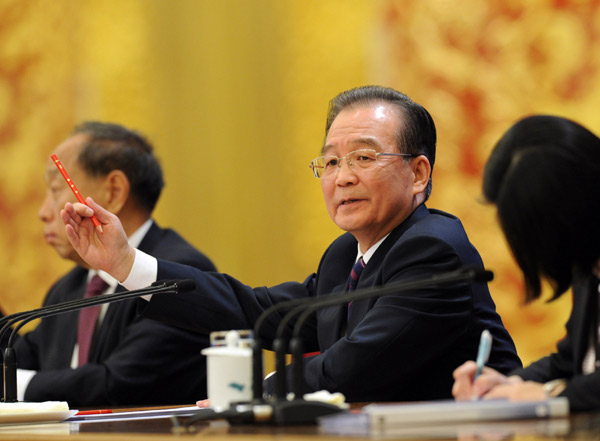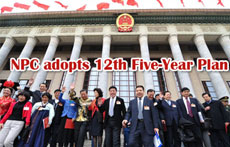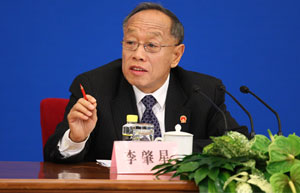Premier: Meeting target 'will not be easy'
By Li Xing and Xin Zhiming (China Daily)
Updated: 2011-03-15 06:57
|
 Premier Wen Jiabao addresses a news conference on Monday at the closing of the annual session of the National People's Congress. Wang Ye/Xinhua |
BEIJING - Meeting the economic growth target in China over the next five years will not be easy, and the government's focus will be on transforming the development pattern, Premier Wen Jiabao told a news conference on Monday.
Achieving annual GDP growth at an average of 7 percent for the 12th Five-Year Plan (2011-2015) period "will not be an easy task", Wen said.
Earlier on Monday, the NPC approved the 12th Five-Year Plan for economic and social development and adopted a resolution to endorse Wen's government work report.
In the report, Wen highlighted development goals in the coming five years and outlined the top government agenda this year.
China still has to resolve long-standing problems in an economy that lacks balance, coordination and sustainability, he said.
Imbalances and coordination problems include the disparities between rural and urban areas, investment against consumption as well as the widening wealth gap, among others.
Meanwhile, there is growing concern over the environmental impact of a resource-fueled economy.
In about two hours and 40 minutes, Wen answered 12 questions that highlighted issues ranging from rebalancing the economic structure, reining in inflation, curbing housing prices, political reforms to private business development.
Wen said China has to "strike the right balance" between growth, jobs and inflation to avoid an economic recession while reducing pressure from rising costs.
"We must make full use of the opportunity (lower growth rate) to adjust the economic structure ... and enable economic growth to fit in with China's population, environment and resources," he said.
He said China must abandon the "GDP only" mentality and ensure that economic growth must no longer be achieved at the cost of resources, energy and the environment.
Wen also called for reforming the evaluation system for judging officials' performance.
Many officials pay far more attention to GDP growth than sustainable economic growth, in order to get promotion, he said.
China must rely on scientific innovation and an improvement in labor quality to enhance the quality and efficiency of growth, he added.
Echoing Premier Wen's remarks over higher quality and slower growth, John Ross, Ken Livingstone's (former London mayor and current mayoral candidate) Policy Director of Economic and Business Policy, said China would find it difficult to meet its environmental targets in the 12th Five-Year Plan period.
"It will require very large investments to create low CO2 emissions and low-pollution power generation and factories - such plants are more expensive than the polluting ones," said Ross, who is also visiting professor at Antai College of Economics and Management, Shanghai Jiao Tong University.
"The crucial task is to change the type of investment - which will take strong government measures," Ross said.
Ross noted that China is "prepared to take the necessary measures and the investment level is high enough to sustain the necessary change to low-polluting production".
Louis Kuijs, World Bank senior economist, said slower growth in China "would likely mean slower global growth, even though there would be somewhat less upward pressure on prices of raw commodities".
"However, if China makes good progress with transforming the growth pattern and increasing the role of consumption and services, the overall impact on the rest of the world should be decidedly positive," Kuijs said.
"With substantial transformation of the growth pattern and full-blown urbanization, China's domestic demand would play an increasingly important role, boosting China's imports," Kuijs said. "This should have an overall positive impact on the world economy."
China's headway in economic recovery and its steady economic and social progress have drawn a lot of the world's attention, but Wen insisted that China has selected a development path that fits its own national conditions.
"It is not right to draw an analogy between China and other countries," Wen said in response to a question about whether other countries could learn from China's development model, especially after "some North African countries have experienced a lot of changes".
All countries should carve out their own roads for development, he said.
China Daily







